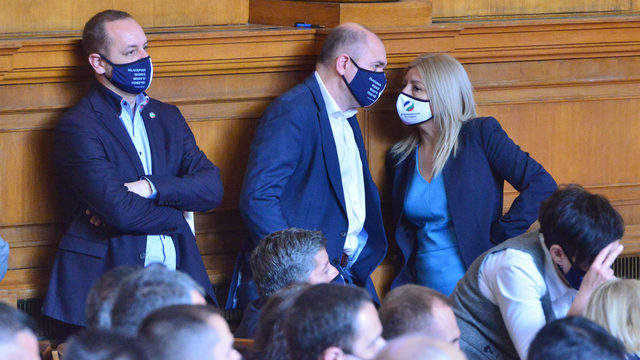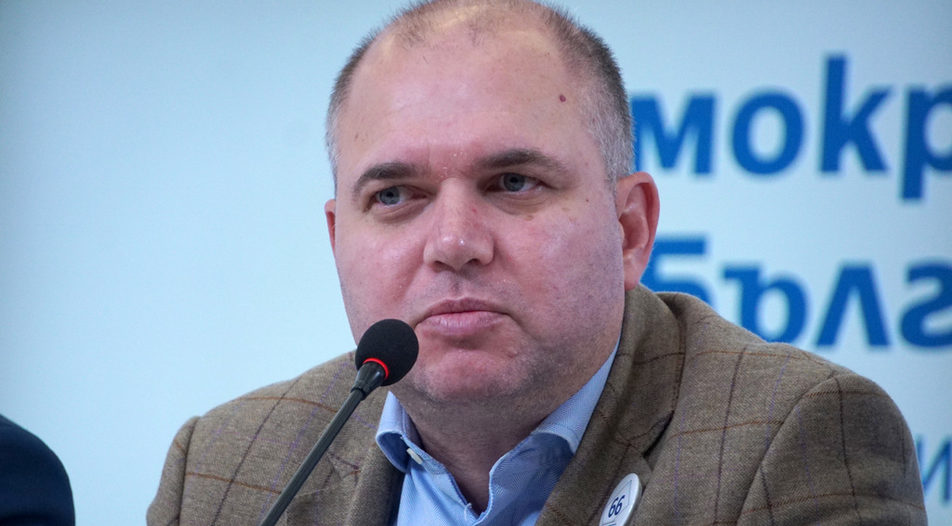- Greens in government need not scare business;
- Concession agreements should be consulted with local communities;
- Currently, the biggest issue for Bulgaria is the closure of Mariza East 2 plant;
- А short-lived Parliament and a cycle of elections may purify the political environment
Bulgaria finally has its first Green members of parliament following the recent April 4 parliamentary elections. Four representatives of the Green Movement, co-led by financier Vladislav Panev, 45, currently sit in the 45th National Assembly as part of the Democratic Bulgaria coalition of centrist parties.
Symbolically, they have been keen to stress that it's not "business as usual". They journey to work by metro, setting an example to their colleagues and Bulgarians alike. And during the campaign, Mr Panev also promoted train travel, criss-crossing the country for a week via the dilapidated Bulgarian Railways. He owns a car, but says it's strictly reserved for weekends.
Mr Panev made headlines in the last year with big revelations he made himself - by going to places and doing livestreams. One of them was from an illegal garbage-burning site used by a large power plant, another - from an illegal mansion in the forests, built by a powerful businessman with political connections. Now in Parliament, as part of a small but outspoken coalition, he might even end up somewhere near a government - a first for the Greens ever.
How did they get there
It took the Green Movement 13 years as a party - and even longer as a cohesive social movement - to get elected. Perhaps surprisingly - considering they led protests against environmental destruction that consistently drew thousands to Sofia's streets - the party never crossed the 1 percent electoral barrier. Panev is realistic about the way relative poverty has shaped Bulgarians' past political choices.
"When people are wealthier, they consider other things to be priorities and this affects the way they vote - they consider preservation of nature, equality and so on. But here in Bulgaria we have been on the lower levels of the Maslow pyramid," he concedes.
"Now it is a completely different story. I think the party also got wiser. We are much more willing to enter alliances and we feel very comfortable within the Democratic Bulgaria coalition with Democrats for Strong Bulgaria and Yes, Bulgaria, because I think we share 90 percent common values," he says about his coalition partners.
An unorthodox Green movement
For an outsider - especially Westerners - the positioning of the Bulgarian Greens both on the general political spectrum and as part of the Democratic Bulgaria coalition might seem strange. European Greens are mostly socialist, even more than the traditional social democratic parties. In Bulgaria, however, the Green Movement occupies the centrist-liberal spectrum, whose priorities include judicial reform and strengthening the rule of law rather than reforming capitalism. Panev himself is a financier and business-person - not the typical Green politician.
"Bulgaria's problems are so different to other European countries, that the left-right division doesn't make sense," responds the leader of the movement. "We consider the Green party here to be a centrist and liberal force, not a socialist one at all." This divergence, he believes, stems from the different historical paths of Eastern and Western Europe: "In many Western countries the greens fight capitalism, whereas here in the East we care about our freedom, above all, because we lived in completely closed societies until 1989."

For Mr Panev, creating a good environment and clear rules for business would help both the economy and the state. "Greens in power mean a fairer, calmer environment to make business and fair relations between the government and the business as a whole. Businesses need to know that with the Greens in power they can feel safer about the rules," he says.
On mining and beaches
Mining, in particular, is one of the traditional bugbears of environmentalists worldwide, and Bulgaria is no exception. One of the few successful referendums to date has been a local initiative in the Tran region to ban the development of a new mine. "There are different ways of doing business and mining in particular can either be environmentally-friendly, or not. If we consider the environmental costs of mining, these should be included in the concession fee and the negotiations within the particular community. They should be offset by benefits for the latter. Then mining would become a bit more expensive business, and then only higher added value mining, with particular care for the environment, would occur," Mr Panev says.
The big problem with mining in Bulgaria is that concessions are arranged between companies and the central authorities; the locals are rarely, if ever, consulted. If this changes and the last word remains with local communities, the Green Movement leader believes, only profitable and environmentally-friendly projects would ensue.
He takes a similar view on the sensitive subject of coastline development. "We often get informed about construction plans on protected dunes. I think the issue is in the grey sector where, by law, you can't construct anything there. But if you are close to someone in the central or local authority, you can find a way to do it," Mr Panev says. He adds that this is harmful to both the environment and business, destroying nature and the level-playing field for doing business. "It is mostly corruption and what we call 'connections' in Bulgaria. We have some 'famous' mayors in seaside towns, so you can always find some doors to construct what you want."
Scepticism towards EU funds
Perhaps surprisingly, the Bulgarian Greens are not the biggest fans of EU subsidies. Mr Panev's business background makes him sceptical about any sort of funding that distorts the market and, in the case of Bulgaria, strengthens the shadowy interests that tie economic and political elites. "Bulgarian industry hasn't changed in the past decade and that was due to Bulgarian policies of using the EU subsidies to get the oligarchs rich and not shift the economy towards less carbon-intensive production," he says.
This lack of foresight is jeopardizing tens of thousands of jobs, he believes, mostly in the "coal mining heart" of Bulgaria, the Mariza East conglomerate near Stara Zagora. "Now carbon emissions hit 45 euro, just a few years ago they were 4-5 euro, so a tenfold increase, which is unbearable for many industries. One is the energy industry - Mariza East 2 coal plant will lose 250 million euro this year. We should invest more in these industries, grants, or loans, or a combination of both, because they need to survive and restructure," Mr Panev says.
"This is the biggest issue in Bulgaria right now, not the buildings insulation program which was the top priority until now and was crucial to the EU funds absorption model Boyko Borissov applied - funds going towards his circle of friends. We lost a lot of time and opportunities for Bulgarian industries to get stronger and more competitive," he adds.

Mr Panev thinks that the focus of the EU recovery plan and the Green deal in Bulgaria should be on Mariza East 2, as tens of thousands of jobs are at risk there. But it also presents an opportunity. "They have the grid, they need new technology and this will create a new industry," he says. The same, he believes, applies to many sectors of the economy: "I think every business can be made greener and Bulgaria has the people and know-how to develop greener businesses, but what we need is a better business environment and more stable laws," he concludes.
Parliament priorities
For now, however, the Greens in Parliament have to focus on other issues in what looks likely to be a short-lived National Assembly. Changes to the electoral law "to ensure fairer elections'' and proposed revamping of the judiciary to "see who is on our side among the reformist parties" are their first priorities, Mr Panev says. He will also propose a bill to cut down social security payments by about a third until the end of the year. "This will leave half a billion euro more for businesses and those suffering the most from the crisis," he says.
He claims not to fear early elections and a short-lived parliament. "I think Bulgarian political life needs up to two elections to get a bit more purified. I have already said we might need a cycle of elections to change the political environment."
In keeping with the poisonous public atmosphere, Mr Panev has already felt the first blows from the entrenched powers. In the months before the election a smear campaign was launched against him by the tabloid government mouthpiece Pik.bg, and in the first days of parliament he got a notice that the Financial Oversight Commission will scrutinize every single deal he had done over the past 24 years. "They said it is a routine check, but it is unique," he laughs, adding that he has nothing to hide, as the capital market is a very transparent industry.
Overall, although Mr Panev is not exactly hailing the arrival of a new "green" dawn, he seems sanguine about his movement's progress. The genie of environmental awareness is out of the bottle. So maybe Bulgarians have finally scaled another rung of Maslow's pyramid, after all.
- Greens in government need not scare business;
- Concession agreements should be consulted with local communities;
- Currently, the biggest issue for Bulgaria is the closure of Mariza East 2 plant;
- А short-lived Parliament and a cycle of elections may purify the political environment
Bulgaria finally has its first Green members of parliament following the recent April 4 parliamentary elections. Four representatives of the Green Movement, co-led by financier Vladislav Panev, 45, currently sit in the 45th National Assembly as part of the Democratic Bulgaria coalition of centrist parties.













